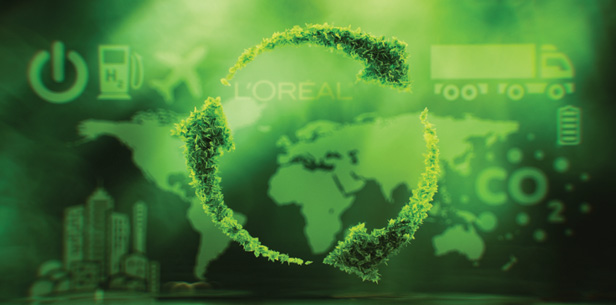Sustainability May 14, 2024
L’Oréal Now Calculating Environmental Impact of Promotional Materials
The beauty company is using EcoDesignCloud, a tool that assesses the lifecycle of products, to help it create more ecologically designed luxury displays and gifts-with-purchase.
Global beauty company L’Oréal is taking steps to measure the footprint of its point-of-sale and promotional materials.
The company is using EcoDesignCloud by Eviden to calculate the impact of materials throughout their lifecycle, using an internationally recognized product environmental footprint (PEF) methodology that looks at 16 criteria including carbon emissions. Similar to a lifecycle assessment (LCA), the PEF methodology is an initiative launched by the European Commission and is meant to standardize the way companies measure the environmental impact of products throughout their lifecycle, considering both supply chain and downstream activities like distribution of finished goods to consumers.

EcoDesignCloud provides in-depth scoring and simulations for L’Oréal and its suppliers, allowing them to identify and select retail and promotional items with the lowest environmental impact. L’Oréal notes that early assessments with the tool have already helped it conceive more ecologically designed luxury displays and gifts-with-purchase.
“Assessing the environmental performance of our suppliers will enable us to support our partners as well as lead the retail industry toward a more sustainable economy,” said Antoine Vanlaeys, chief operations officer for the L’Oréal Groupe. “This level of transparency and cooperation can also open up new avenues for innovation by exploring how different configurations, designs, materials and processes can completely reinvent sustainable beauty experiences in-store. With our sourcing team, we are proud to onboard our ecosystem of suppliers and accelerate our transformation journey with a new, sustainable retail experience.”
EcoDesignCloud is a cloud-based platform that uses artificial intelligence to help organizations in their sustainable product management and development by calculating the environmental impact of each product at every stage of its lifecycle. Eviden, the company that developed the platform, said it relies on internationally trusted and recognized data sources to measure the environmental impact and CO2 emissions for any product design or purchase throughout the supply chain. Using lifecycle inventory databases to generate an EcoScore, the platform lets users measure impact in a matter of minutes, rather than the months that traditional methods often require.
“Our EcoDesignCloud platform has various use cases, for example, in manufacturing to efficiently assess Scope 3 emissions and in the consumer-packaged goods sector to support product designers, retailers and suppliers in optimizing the environmental impact of their products, packaging and merchandising solutions,” said Benoit Couchon, chief revenue officer for EcoDesignCloud.
Scope 1 and 2 emissions are associated with direct energy consumption and purchases, whereas Scope 3 – which encompass the vast majority of emissions for most companies – are related to indirect emissions that occur up and down a product’s value chain, beginning at the raw-material stage and extending to when it reaches the end of its useful lifespan. As brands increasingly seek to tackle their Scope 3 emissions, many are turning to LCA assessment tools to help.

Promo for the Planet is your destination for the latest news, biggest trends and best ideas to help build a more sustainable and socially-responsible industry.
